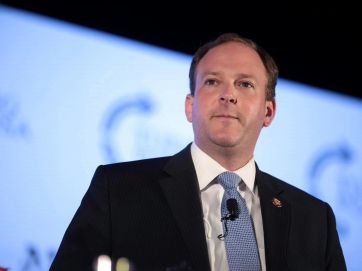“We’re part of nature and as we destroy nature we destroy ourselves. It’s a selfish thing to want to protect nature.”
So says Yvon Chouinard, founder of the outdoor clothing company
In a new paper titled “Sustainability: Virtuous or Vulgar?” written for BioScience magazine, John A. Vucetich and Michael P. Nelson [1] assert that “’being sustainable’ has become more-or-less synonymous with ‘being good,’” and that being good means “understanding how to balance sustainability’s three primary virtues: concern for human needs, ecosystem health, and social justice.” Indeed, sustainable has become synonymous with good. We’ve seen this concept commercialized this year with the dud TV show The Goode Family, about a family of politically correct vegan environmentalists who just want to do the right thing—whatever the current definition of that may be; and in the MasterCard ad where a young boy prompts his father to save energy, plastic bags, and water—“Helping Dad become a better man: priceless.”
Two Motives: Virtuous and Vulgar
But why are we all trying so hard to be better in this way? What really motivates us toward this new morality? Is it the capitalistic motive—saving money on the utilities bill? Is it the human-centered motive—guaranteeing a good life for future human generations? Or is it the nature-centered motive—saving the planet for its own sake?
Vucetich and Nelson suggest that the nature-centered motive should have a more prominent place in the push for “sustainability.” As they frame it, this nature-centered approach is “ethical,” in contrast to other approaches that allow for some play of self-interest. The view that self-interest and ethics are opposed is, of course, open to dispute. Writing about their article in Reason magazine, Ronald Bailey says: “Vucetich and Nelson style their argument as chiefly a plea for universities to include ethicists in the debates over the meaning of sustainability, but they clearly want to smuggle in a specific ethical view, e.g., ecosystems have some kind of inherent moral value independent of human desires.”
As Professor Daniel Bonevac demonstrated in his recent Academic Questions article (pdf), sustainability is a deeply muddled concept as an ethical constraint. It has hundreds of definitions, each of which set out different and conflicting ethical mandates. Vucetich and Nelson bifurcate two approaches to sustainability, taken from two interpretations of what sustainability actually means (see table below). Those who think sustainability means “Exploit as much as desired without infringing on future ability to exploit as much as desired” take the vulgar, human-centered view. This approach has also been called “weak” sustainability. On the other hand, those who believe sustainability means “Exploit as little as necessary to maintain a meaningful life” take the virtuous, nature-centered view. This approach is also referred to as “strong” sustainability.
| Virtuous/Strong/Nature-Centered | Vulgar/Weak/Human-Centered |
| Exploit as little as necessary to maintain a meaningful life | Exploit as much as desired without infringing on future ability to exploit as much as desired |
| Sustaining natural capital | Sustaining human welfare |
| Animal and plant populations are most healthy when they exist in “natural” conditions | Animal and plant populations are healthy in conditions most conducive to human needs (i.e. hunting, farming, etc.) |
These two distinct views shape our beliefs about how the natural world ought to be. According to the “virtuous” opinion, plant and animal populations (the authors use North African ungulates as an illustration) are most healthy when they exist in “natural” conditions. According to the “vulgar” opinion, plant and animal populations are most healthy when they serve human purposes (such as hunting and farming). The “virtuous” view would have humans share surplus meat with animal predators, such as wolves, to ensure that the wolf population does not die out.
Is this way of framing the sustainability debate really accurate? Or have Vucetich and Nelson constructed a straw man in their “vulgar/weak/human-centered” version of sustainability? The sustainability advocates on the “vulgar” and “weak” side certainly don’t get to enjoy a rhetorically-neutral description in this characterization. Nor is it easy to think of sustainability advocates of any sort who commence with the premise “exploit as much as desired…” But perhaps even a caricature can tell us something. One thing it tells us is that sustainability advocates score points by trying to outdo each other in the race to find a source of moral authority that diminishes or eliminates the importance of humanity.
To Be Alive is to Be a Murderer
Harold Fromm, a visiting scholar of English and author of The Nature of Being Human: From Environmentalism to Consciousness, recently pondered this clash of values in his article “Vegans and the Quest for Purity” (subscription required). He contrasts “biocentrism” (espoused by vegans) to anthropocentrism.
His conclusion: it is impossible for a human to be purely biocentric. Even if you shun meat and dairy products, settle for cheap (non-leather) shoes, and never step on an ant. Despite some people’s best intentions to pass through the world without so much as sampling pistachio ice cream, Fromm argues, they will continually fail at biocentrism:
Refined as some of our moral sensibilities may now be, there's nothing we can do to outwit this fact: To be alive is to be a murderer. Or to be murdered. [...] Life is everywhere. I squash millions of micro-organisms with each step and wash down the drain unnoticed multitudes with each shower. Brushing my teeth kills innumerable bacteria (it's them or my gums!).
Fromm nails down the real reason people choose vegan lifestyles: “Behind their beliefs is the hopeless longing for innocence. Except that there is no innocence.” Biocentrists—vegans and sustainatopians—are ultimately searching for absolution from guilt. That’s why the sustainability movement has become not only a tool for measuring morality but also a holistic belief system. According to Fromm’s argument, it’s a futile belief system through which righteousness is impossible to achieve.
College Sustainability and Ethics
It may be impossible, but that’s not stopping people from trying. Colleges and universities, which for several decades puffed themselves up with proud commitments to “diversity,” have taken up the sustainability mantra with gusto. 673 colleges and universities have pledged to make “climate neutrality and sustainability a part of the curriculum and other educational experience for all students.” So far, 160, including Yale, NYU, Rice, Duke, UCLA, and Florida State University, have volunteered to have the Association for the Advancement of Sustainability in Higher Education (AASHE) measure their progress toward sustainability.
In order to fulfill their pledges and meet their quotas, colleges and universities often hire “green deans” or chief sustainability officers. Vucetich and Nelson assessed cluster hires in sustainability at nine universities from 2008-2010. They categorized each faculty position as associated with one of five dimensions, all of which the authors believe are “necessary for realizing sustainability” and which should engage “every academic discipline”:
- Meeting human needs efficiently 63%
- Describing ecosystems 3%
- Describing how exploitation affects ecosystems 17%
- Describing exploitation affects society 17%
- The ethical dimension – social justice, human responsibility 0%
They conclude that academia has woefully “neglected sustainability’s ethical dimension.”
But is that really the case?
- Demonstrate knowledge of practical ethics and the process of sustainability in decision making among energy client/stakeholder relations
- Advocate effectively for sustainable practices in businesses, government and energy production, and energy consumption practices
Furthermore, Academia.edu lists 184 scholars and researchers who have ethics and social sustainability as a research interest.
The Social Justice Connection
Vucetich and Nelson acknowledge one major human-focused aspect of sustainability: its “social justice” imperative. It has been said that “There can be no sustainable communities and institutions without social justice” (John B. Cobb Jr., “Sustainability and the Liberal Arts” conference, 1998).
Sustainability as a concept is commonly illustrated as a Venn diagram in which the three overlapping circles are labeled “environmental,” “social,” and “economic.” Economic what exactly? Some diagrams say “health.” Others say “justice.” Often the noun is unstated, and the viewer is left to assume that this is an illustration of What Ought to Be.
Vucetich and Nelson, however, are uncertain about why these ideas go together in the first place: “Although the connection between sustainability and social justice is widely appreciated, and although social justice is certainly a worthy ambition, the logical necessity for connecting sustainability and social justice may be yet unspecified.” But even so, the instinct for attaching the two is, as the authors say, “inescapable.” Hence sustainability’s social and economic sides carry it beyond environmental protection. According to Vucetich and Nelson, “a sustainable society has concern for poverty, racism, political marginalization, the opportunity to make a livelihood, and how social interactions should be fair and equitable.”
These concerns raise philosophical questions to which sustainability advocates are more than happy to provide answers. The result is an ideology that bundles up state-sponsored redistribution, big government, and loss of individual freedoms in an innocent, green-wrapped word, sustainability. Its advocates have successfully equated sustainable with good, so that the environmental, social, and economic aspects appear to our culture as the standards of virtue.
Your Neighbors Are Doing It
But even if we know what good is, will that knowledge alone prompt us to actually seek it? Will the end motivate the means? Vucetich and Nelson argue that it will:
Another criticism of the ethical dimension of sustainability is that though it may be useful for characterizing and identifying various philosophic attitudes about sustainability, it is largely unable to effectively motivate sustainable actions or change attitudes about sustainability (Jamieson 1998, Thompson 2007). This belief is also misguided. Once a group or person has determined what the appropriate end goals of sustainability should be, those end goals are, in an important way, the motivations underlying sustainable behavior.
Robert B. Cialdini, a social psychologist and professor of marketing at
- In order to save the environment
- In order to preserve energy resources for our children
- Because it will save you money
- Because the majority of your neighbors are undertaking energy-saving activity
At the end of the month, energy meters for houses with the #4 hanger had significantly lower usage counts than any of the others, Cialdini said. In this case, neither the nature-centered, nor the human-centered, nor the capitalistic motive won people over enough to cause them to change their behavior. It was the peer pressure factor that got results—the same reason colleges and universities are getting on the sustainability bandwagon today.
Levels of Virtue
Still, in many cases, the virtue argument seems to be working. For instance, in a Chronicle of Higher Ed article on green architecture, the author writes of one architect’s difficulty convincing administrators to build eco-friendly campus buildings: “While he succeeded in persuading them that building green was the right thing to do, he said, ‘there is a lot of resistance.’” Notice that “resistance” succumbed to the persuasion that this was “the right thing to do.” The administrators admitted that “green” building was the right thing to do and allowed it to happen, but they still weren’t excited about doing it.
Conversely, some people take action to protect the environment, but only to save money, not because it’s “the right thing to do.” Some people do it for the Yvon Chouinard reason—because it makes the world a better place for humans. Vucetich and Nelson would call this vulgar. According to them, not only must we be “sustainable,” we must also have the “right” reasons. Turning the lights out to save on the electric bill is a good thing done for a bad reason, and ultimately it only perpetuates the money-loving self-interest that makes our society unsustainable in the first place.
Hence, conformity to sustainable practice is not enough. Being “ethical” means totally transforming our inmost attitudes, values, and beliefs. These scholars make a bold claim in saying that a specific kind of sustainability is today’s definition of virtue. They’ve taken sustaina-righteousness to a whole new level.
It’s an intriguing window into the world of sustainability activists, who often try to out-eco one another by boasting of their tiny carbon footprints and meticulous green lifestyle choices. Vucetich and Nelson play a rhetorical game by saying is that anyone who disagrees with them is unethical and vulgar. How ethical is that?
Abortion Saves Butterflies
Here we are invited to go down the road on which human interest is ethically proclaimed as worthless. Where does that lead? It isn’t hard to guess. The “ethical” view here leads to the punishment of normal human activity in order to “protect” the ecosystem. Who are the punishers? The eco-enlightened elite. It also leads to disregard for human life.
Sustainability advocates have commonly made use of the Brundtland Commission’s human-centered definition of sustainable development: “development that meets the needs of the present without compromising the ability of the future generations to meet their needs.” Contradicting this, Vucetich and Nelson’s theory of ethics says essentially that we shouldn’t want future generations at all.
This idea is already accepted by many. Population control zealots encourage people to have fewer children in the name of preserving a “finite” planet. A “personal environmental audit” called Earthscore (formerly a text for a course at CSU-Chico) says, “The number of children you have is your biggest environmental impact.”
A woman who created a therapeutic website for women who have had abortions writes:
When I see these images I am reminded that because I chose to end my accidental pregnancies, there are two fewer human beings on the earth impacting the habitat of butterflies and other creatures. They make me feel good about the decision I made because I have left more room on Earth for nature to flourish.
She feels good about her decision because she has bought into this idea: the planet is better than people. Protecting it is more morally important than protecting future human generations. Once “ethics” is defined in a manner that eliminates both God and the special position of humanity, we end up with a definition of ethics that is bizarre and destructive.
The Good Life
The National Association of Scholars isn’t a referee for the disagreements among sustainability advocates. Those disagreements, however, offer a window into the internal logic of this movement. We are far from alone in observing that the sustainability movement has a religious character—that it is more a matter of belief than it is of a search for evidence, and that it offers its own versions of sin, absolution, and salvation. In that sense, it ought not to be too surprising that the church of sustainability also has its sects, each offering a different salvational path, and each rather contemptuous of its rivals.
“Sustainability” may be synonymous with “goodness” in some quarters, but those of us who are not pledged converts to this religion can wonder even about that. Not everything in life or in nature is sustainable, and not every human effort needs to be bent in the direction of sustaining nature. When we listen to the sustainability advocates in full cry, we wonder what they make of nature’s own transience. Stars burn out, trilobites vanish from the seas. We generally count humanity fortunate that our ancestors survived the reign of saber-toothed tigers, and that smallpox, yellow fever, polio, and a myriad other diseases have been made a lot less sustainable. We also count it a good thing that humanity can choose to change the world for the better, rather than simply accept it as is. Occasionally that means building dams and bridges and sacrificing one habitat to create another. We don’t count it a tragedy that humans domesticated plants and animals, invented the internal combustion engine, and split the atom.
Perhaps some sects of sustainability are able to make peace with these developments too, but clearly it is a struggle within the movement to recognize that sustainability of the earth is not the measure of all things worthwhile. The central paradox of the sustainability movement is that it exalts itself as dealing with the complexity of our interconnected world while continually coming to rest on simplistic formulations.
[1] John A. Vucetich is an assistant professor of population ecology at Michigan Technological University. Michael P. Nelson is an associate professor of environmental ethics and philosophy atMichigan State University.













